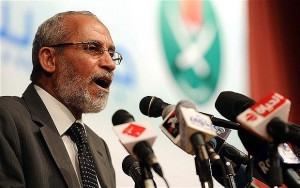Does Pharaoh’s ghost still haunt Egypt?
The much criticized authoritarianism of Egyptian president Abdul Fatah al-Sisi has picked up steam with the sentencing to death of Muhammed Badie, Muslim Brotherhood leader, in Cairo on Monday.
Mohamed Badie, a senior leader of Muslim brotherhood, as well as 21 members of the movement has been awarded death penalty for allegedly preparing attacks against the Egyptian state weeks after the dethronement of democratically elected Morsi government in July 2013. Among the people arrested include Brotherhood’s former spokesperson Mahmud Ghazlan, former provincial governors and other senior leaders of the movement. The court made it clear that it would declare the final verdict in the case on April 11. The military had already arrested thousands of Brotherhood supporters alleging them to have participated in what the Egyptian authorities would call anti-state upheavals. Against the security claims made by the state, human rights activists, even the UN have already raised their concerns over the fairness of trial proceedings in the country.
Though many liberal commentators the world over absolve al-Sisi of the clampdown passing the buck of authoritarianism over to the courts, it has been argued by democratic activists in the country that the barrier between judiciary and executive has been blurred in the aftermath of al-Sisi’s rise to power. In what appears to be his eye-witness account of the political situation in Egypt after al-Sisi’s coming to power, noted political commentator Vijay Prasad writes:
“Thousands of Muslim Brotherhood members have been sentenced to death in mass trials. The courts continue to sentence to death large numbers of people, 529 here, 183 there, in mass trials. All the signs of rebellion have been erased. Graffiti near Tahrir have been scrubbed. On that Friday, the Muslim Brotherhood members took to the streets of Alexandria and faced police gunfire. One young protester, Sondos Reda Abu Bakr, 17, died in the barrage.
To inoculate itself against criticism, the El-Sisi government has banned protests. Law No. 107 gives the government extraordinary powers to curtail demonstrations and to imprison demonstrators. Many of the main leaders of the 2011 protests have been victims of this law. The leaders of the April 6 Youth Movement and Kefaya, Ahmed Maher and Mohammed Adel, are serving three-year prison sentences for political protest. Alongside them, the courts sentenced, to various terms, the rights activist Yara Sallam, the student activist Sanaa Seif, her brother and the prominent activist and blogger Alaa Abd el-Fattah, and the photojournalists Abdel-Rahman Mohammed and Rania el-Sheikh. Their comrade, Ahmed Douma of the Egyptian Popular Current, has now been sentenced to life imprisonment along with 230 others. The charge was illegal protests and incitement to violence.”
(Quoted from The Night is Long)
The clampdown is going on against all sections of protesters. Last month, pro-democratic activist Alaa Abd el Fattah was sentenced to five years in prison in a verdict of which Egyptian novelist Ahdaf Soueif said: ‘It takes your breath away.’ He is alleged to have violated a law that has banned protests which raise political slogans against the state. A software engineer, blogger and activist, he was in the forefront of uprising against the tyrannical regime of Hosni Mubarack. During the court proceedings, he was caged in an electrical bar and was not allowed to meet media persons and members from his family.
The situations in Egypt which liberal media claims are hiccups in the country’s onward march to progress hardly ooze optimism about the country’s democratic future.























Connect
Connect with us on the following social media platforms.